皮尤研究中心:討厭中國的國家排名
・87%的日本人和85%的澳洲人討厭中國
・世界對中國看法的重大調查
我們為您帶來台灣媒體台北發表的文章摘要。

Taiwanese media Taiho:
On July 10, Pew Research released the results of a public opinion survey.
Pew Research survey:
Citizens of 35 countries were surveyed by phone, face-to-face, and online.
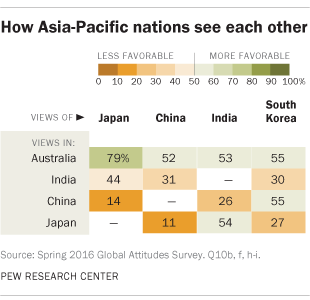
Two countries that dislike China:
Recently, countries in the Indo-Pacific region have felt that China is a threat due to territorial disputes.
1. The percentage of people who dislike China has risen sharply to 87% and 85% in Japan and Australia.
2. Sweden (82%) and the United States (81%) also exceeded 80%.
Negative images of China are also prominent in Germany (76%), the Netherlands (74%),
Poland (71%), Canada (71%), and
South Korea (71%).

Thailand’s love for China:
1. Thailand has the most favorable view of China, at 80%.
2. The reason for this is that “Thailand has no territorial disputes with China.”
The same view is also relatively high in Nigeria (75%), Kenya (73%), Tunisia (68%),
Singapore (67%), and Malaysia (64%).
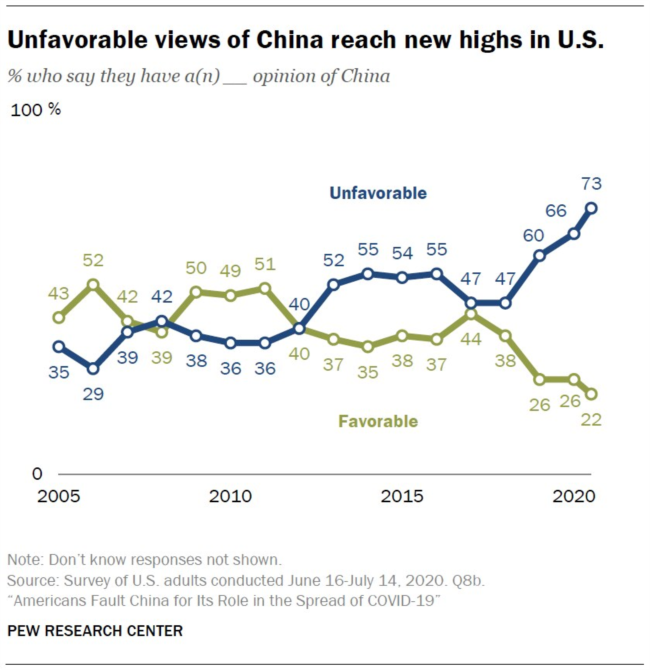
This opinion poll:
90% of Filipinos and 80% of Australians expressed concern.
Similar concerns are also strongly held in Japan and South Korea.
https://www.recordchina.co.jp/b936813-s25-c100-d0052.html

Pew Research Center :a new survey of 35 countries.
ーPeople around the world feel China’s economic influenceー
Large majorities in nearly all the nations we polled
– spanning six continents and ranging in income level –
China’s economic influence is now felt more widely than it was when we last asked this question in 2019.
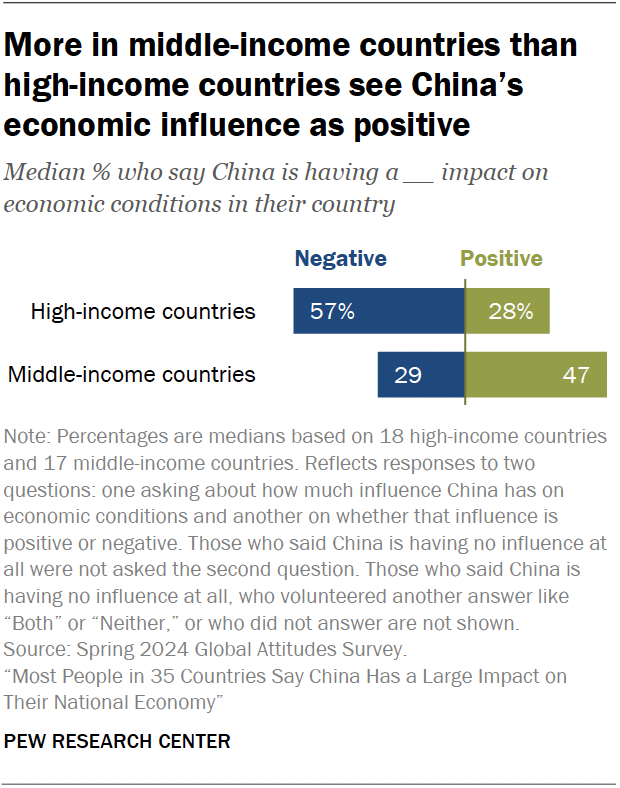
In 10 of the 13 countries:
a larger share say China has a great deal of impact on their country’s economy than said so five years ago.
In the middle-income countries:
people tend to view China’s economic influence as a good thing.
in the high-income countries:
people tend to see it as a bad thing.
In the 17 middle-income countries:
a median of 47% of adults say China has a positive influence on their country’s economy, while 29% say it has a negative impact.
In the 18 high-income countries:
a median of 57% of adults say China’s economic influence is negative, while 28% say it’s positive.
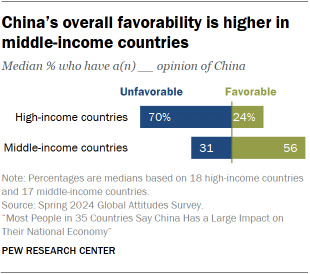
Americans negative views:
Americans are the most likely to have negative views of China’s economic impact.
About three-quarters say China’s influence on the U.S. economy is negative.
Others negative views:
In Argentina, Brazil, Israel, Japan, South Korea and Tunisia,
say China has a negative economic influence on their country than said so in 2019.
Overall favorability of China :
Across the middle-income countries surveyed, a median of 56% view China favorably.
These are among the key findings of a new survey of 44,166 people in 35 countries conducted from Jan. 5 to May 21, 2024.
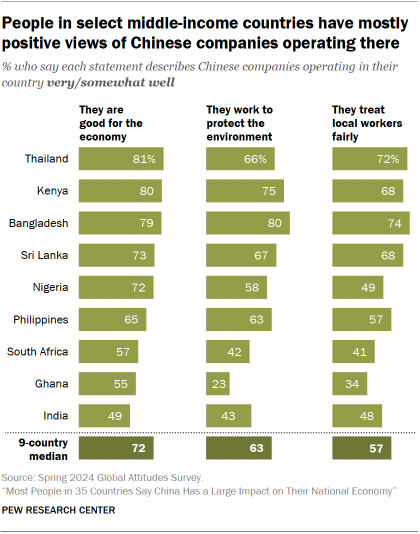
China’s Belt and Road:
China launched its Belt and Road Initiative in 2013.
And according to a Bloomberg analysis of data from China’s Ministry of Commerce, its investments overseas are at their highest point in the last eight years.
1.Views are most positive in Thailand (81%), Kenya (80%) and Bangladesh (79%), though a majority or plurality hold this view in each of the nine surveyed countries.
2.In Ghana, Nigeria, the Philippines and South Africa,:
Around four-in-ten do not think Chinese companies operating in their country treat local workers fairly.
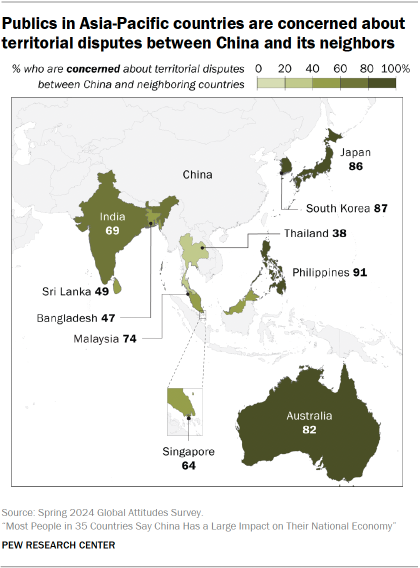
Territorial disputes in the Asia-Pacific region:
China is party to multiple territorial disputes in the Asia-Pacific region,
Related to the South China Sea, the East China Sea or borders such as those between China and India.
1.Philippines:
Border tensions with China largely center on the Second Thomas Shoal of the Spratly Islands,
91% say they are concerned about territorial disputes between China and its neighbors, including 65% who are very concerned.
2.Australia, Japan, Malaysia, South Korea :
Around three-quarters or more in Australia, Japan, Malaysia and South Korea also express concern.
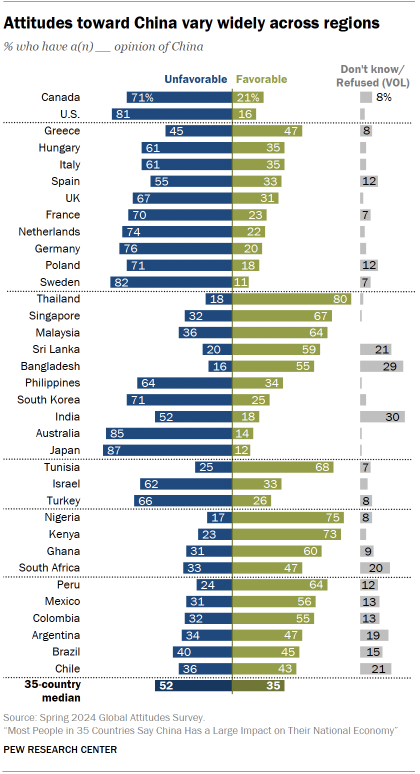
Across the 35 countries we surveyed:
more countries have unfavorable views of China than favorable ones.
Chinese President Xi Jinping:
People mostly lack confidence in him to do the right thing regarding world affairs.
Views tend to be among the most and least positive in the Asia-Pacific region
1. more positive in middle-income countries like Malaysia and Thailand,
2.more negative in high-income ones like Australia, Japan and South Korea.